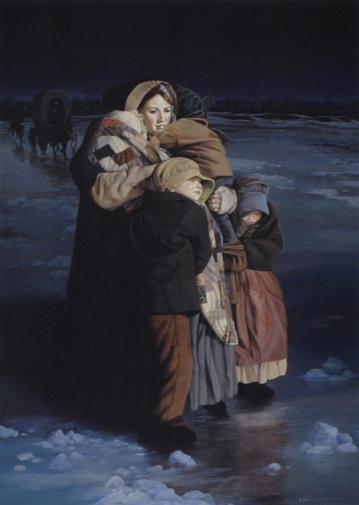
 During their seventeen-year marriage, nine children were born to Joseph and Emma, and they adopted two. Emma’s first three children died shortly after birth: Alvin in 1828 and twins in 1831. They adopted twins, Joseph and Julia Murdock (born on May 1), whose mother, Julia, had died the day after the birth of Emma’s twins, leaving a bereaved husband unable to care for the infants. Little Joseph Murdock died in March 1832 as a result of exposure during an incident of mob violence. The following November, Emma gave birth to a healthy son, Joseph Smith III. Although Emma enjoyed little Julia and Joseph, she grieved over her lost babies.
During their seventeen-year marriage, nine children were born to Joseph and Emma, and they adopted two. Emma’s first three children died shortly after birth: Alvin in 1828 and twins in 1831. They adopted twins, Joseph and Julia Murdock (born on May 1), whose mother, Julia, had died the day after the birth of Emma’s twins, leaving a bereaved husband unable to care for the infants. Little Joseph Murdock died in March 1832 as a result of exposure during an incident of mob violence. The following November, Emma gave birth to a healthy son, Joseph Smith III. Although Emma enjoyed little Julia and Joseph, she grieved over her lost babies.
The Lord comforted Emma in her patriarchal blessing: “Thou hast seen much sorrow because the Lord has taken from thee three of thy children. In this thou art not to be blamed, for he knows thy pure desires to raise up a family, that the name of my son [Joseph Smith, Jr.] might be blessed. And now, behold, I say unto thee, that thus says the Lord, if thou wilt believe, thou shalt yet be blessed … and thou shalt bring forth other children, to the joy and satisfaction of thy soul, and to the rejoicing of thy friends.”
Emma’s faith was rewarded: Frederick was born in 1836, and Alexander in 1838. Don Carlos was born in 1840, but he died fourteen months later. An unnamed son was stillborn on 6 February 1842; and David Hyrum was born in 1844, four months after the death of his father. Emma did not know a settled home until Nauvoo. Due to persecution and to further the Lord’s work, members of the Church moved from state to state. Emma suffered much tribulation. She was robbed and ridiculed; she and the children often went hungry. Still, she struggled to provide for her children during Joseph’s imprisonments and long absences. Many Saints helped her, but some took advantage, severely increasing her difficulties and undermining her trust. While Joseph and the other Church leaders were unjustly imprisoned at Liberty, Missouri, Emma and her four little children became part of the major Church exodus from the state after the extermination order was issued on 27 October 1838 by Missouri governor Lilburn Boggs.

From Quincy, Illinois, in March 1839, Emma expressed her loyalty to Joseph in these words:
“I shall not attempt to write my feelings altogether, for the situation in which you are, the walls, bars and bolts, rolling rivers, running streams, rising hills, sinking valleys and spreading prairies that separate us, and the cruel injustice that first cast you into prison and still holds you there. … Was it not for conscious innocence and the direct interposition of divine mercy, I am very sure I never should have been able to have endured the scenes of suffering that I have passed through … but I still live and am yet willing to suffer more if it is the will of kind heaven, that I should for your sake … and if God does not record our sufferings and avenge our wrongs on them that are guilty, I shall be sadly mistaken. … You may be astonished at my bad writing and incoherent manner, but you will pardon all when you reflect how hard it would be for you to write when your hands were stiffened with hard work and your heart convulsed with intense anxiety … but I hope there is better days to come to us yet. … I am ever yours affectionately. Emma Smith.”
